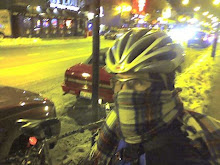I occasionally enjoy your writings for the principled conservatism you express, but I found your February 27th contribution in Newsweek to be nothing but good, old-fashioned red-baiting at its most base:
"...the real reason for progressives’ passion for trains is their goal of diminishing Americans’ individualism in order to make them more amenable to collectivism."
High Speed Rail as is being pushed by the DOT and Obama is undoubtedly going to be wasteful, but don't use that to paint the entire mode of Rail. Rail is much more economical than driving in terms of fuel efficiency in $/passenger-kilometer, and the basis of the infrastructure is already there and just needs to be revived/updated.
Yes, if viewed as a purely government-funded exercise, rail is more expensive. But rail pays a greater percentage of its way through fares (62% of operating expenses) than driving does via gas taxes and tolls (less than 50% for the Federal Highway Administration).
Further, why is rail vilified for being subsidized by the government when the same can be said for our highways? Because its detractors can't let go of cheap gas (gone forever), and are deliberately comparing apples to oranges: on percentage of current mode-share vs. what is currently subsidized through taxes. Rail ridership grows every year, and track infrastructure with equal mode-share is much more economical than continued maintenance of interstate highways we can no longer afford.
Fighting "global warming" is an unwinnable battle but, rail also pays dividends in reducing pollution and improving public health. Why do you hate people's lungs, George?
There's no denying the $50-80 billion nationally per year in additional healthcare costs from transportation related pollution. To say nothing of the $150 billion in additional costs dealing with type 2 diabetes - a direct result of our car-dependent sedentary behavior.
The free ride of cheap oil is over, George. The airlines will soon be a millionaires club, and local travel and development will be increasingly more oriented towards transit, bicycling, and walking. The direct and indirect costs of a car-only transportation policy are simply too great to bear anymore. Roads are not an entitlement, and it's time to stop paying for them with the wallets of the middle-class and lower, as Scott Walker is doing in Wisconsin.
Your argument is bullshit and reactionary. You know this, so you just resort to the fossilized cliché of calling people "communists." It is your only defense against people who don't embrace the pointless consumerism of car-culture or the fallacy of "individualism" predicated on an endowment of cheap, convenient energy. Against those who place more value on public space, community, efficiency, and health.
American individualism is far older the automobile; it was born out of finding a better way of doing things.




